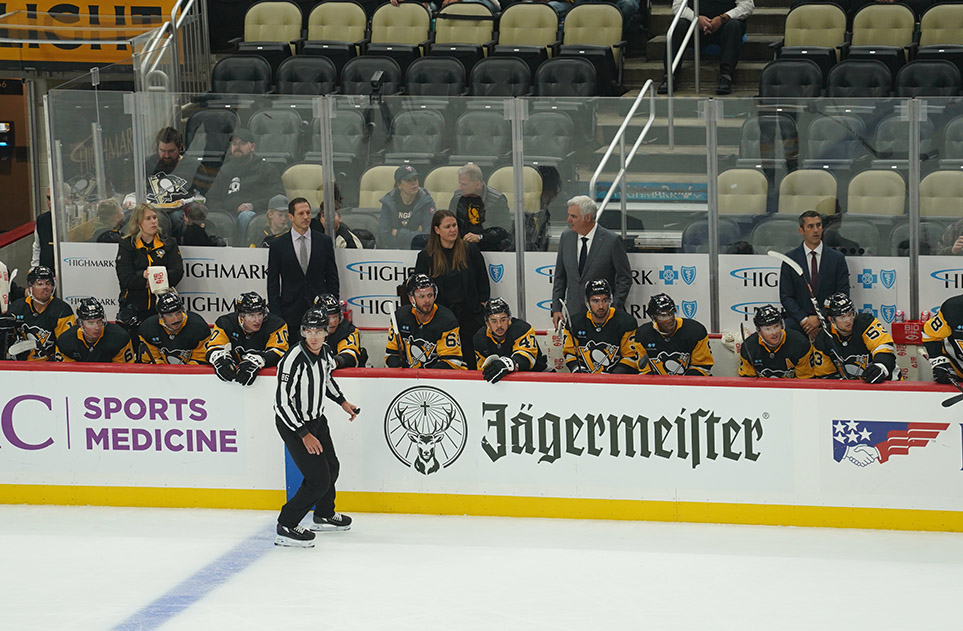The Explorers
Walk along with us and explore the steps University of Pittsburgh Health Sciences students take on their journey to discovering their education, careers and themselves.
Game Time
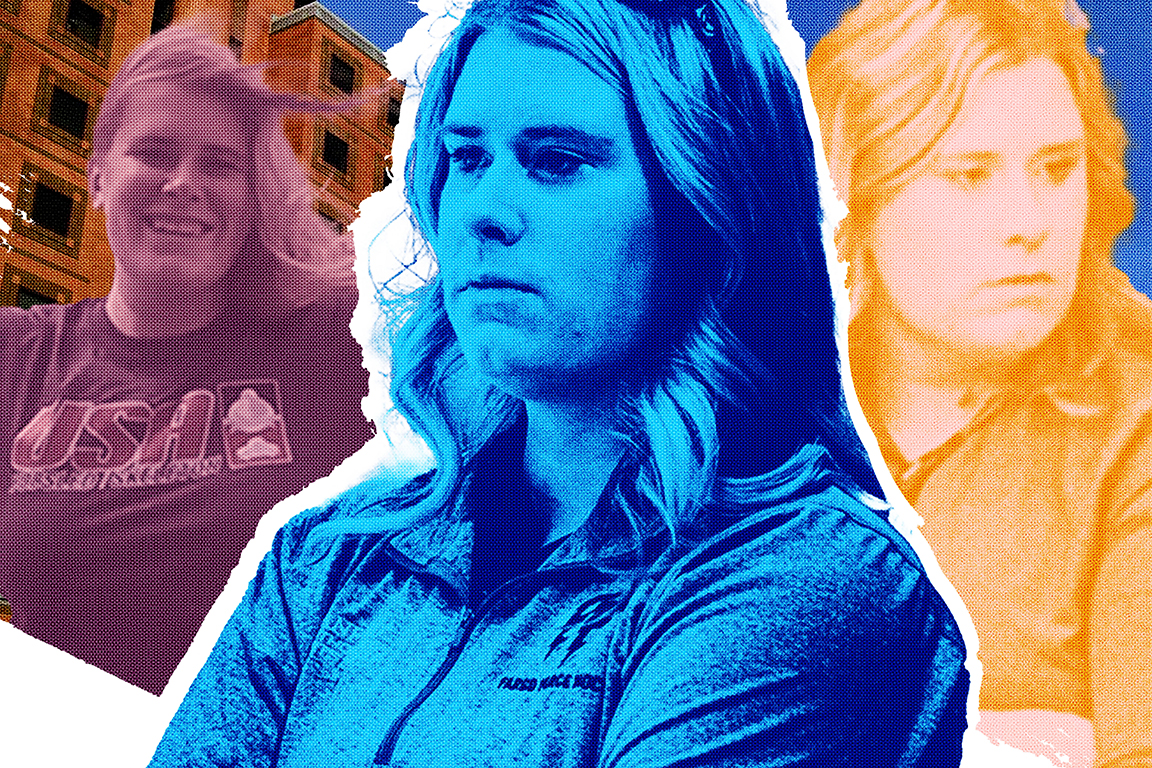
“As athletic trainers, we are with the athlete from the moment of injury through their diagnosis, their rehab, and their return to sport.”
Lauren Rittle
During the Pittsburgh Penguins preseason matches in September 2023, Lauren Rittle, a 2018 graduate with a bachelor’s degree in athletic training from Pitt’s School of Health and Rehabilitation Sciences, became the first female athletic trainer to work the Penguins’ bench.
Rittle has had her eye on that goal for a long time, and she keeps drawing attention for breaking barriers.
“I have now been the first female athletic trainer on four different benches: With the Fargo Force in the USHL, which is the premier Junior Hockey League in the US,” Rittle said. “And then my team now, the Wheeling Nailers; the Pittsburgh Penguins, for their preseason game and then also the Wilkes-Barre/Scranton Penguins for their preseason game.”
She noted that an increase in the number of female coaches and administrators has helped women make inroads in other aspects of the historically male-dominated sport.
“At Pittsburgh’s facility at the Lemieux Sports Complex, they have a freshly renovated women’s locker room in the Penguins section because they have a few female coaches and a few female administrators, so it was really nice to have that,” she said. “You’re seeing that become more of the norm now that women are breaking into hockey. Hockey was slow to catch up with the times, but we’re getting there.”
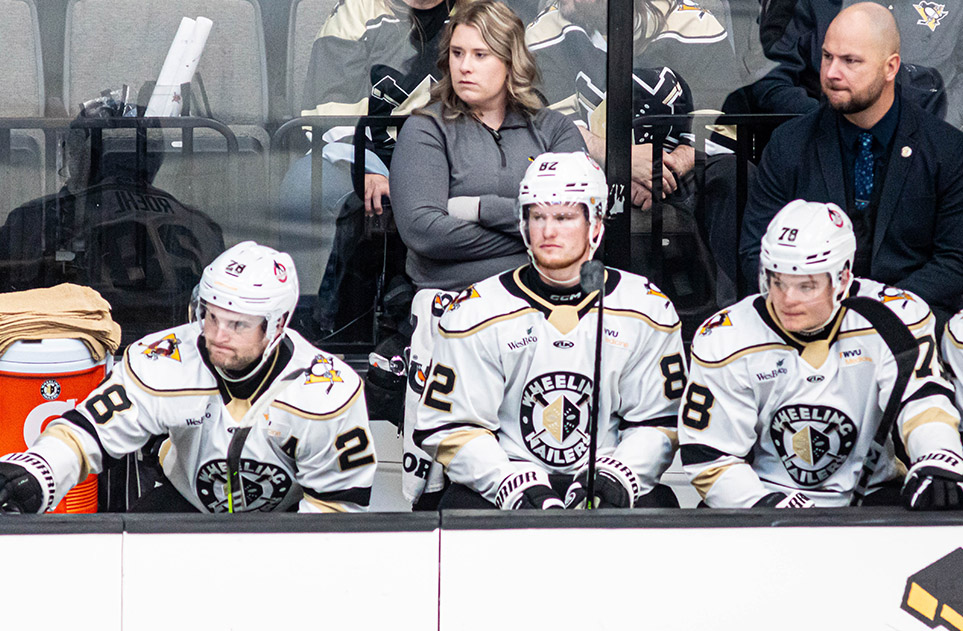
The First Step:
Faceoff
Growing up in Harrisburg, PA, Rittle knew she wanted to go into the medical field. She also was interested in sports, particularly ice hockey. In high school, she realized that sports medicine and athletic training offered a chance to combine her interests in medicine and sports.
“I shadowed my athletic trainer in high school and I ended up getting in contact with the athletic trainer for the AHL team, the Hershey Bears, Dan ‘Beaker’ Stuck,” she recalled. “That was kind of like my ‘Aha, this is what I want to do’ moment.”
“As athletic trainers, we are with the athlete from the moment of injury through their diagnosis, their rehab, and their return to sport. Then we’re also with them that first moment back or that first goal back,” she explained.
“We are not like the doctor where we just see them when they’re hurt, then you don’t see them again for six weeks. Or with a physical therapist, you only see them two or three times a week for an hour at a time. I’ve been with my guys today since eight o’clock this morning. And I will do that again tomorrow and the next day and the next day. You really get to know them as people.”
She added: “I grew up a fan of the sport and there’s no better feeling than being on the bench of a hockey team, particularly when they’re winning.”
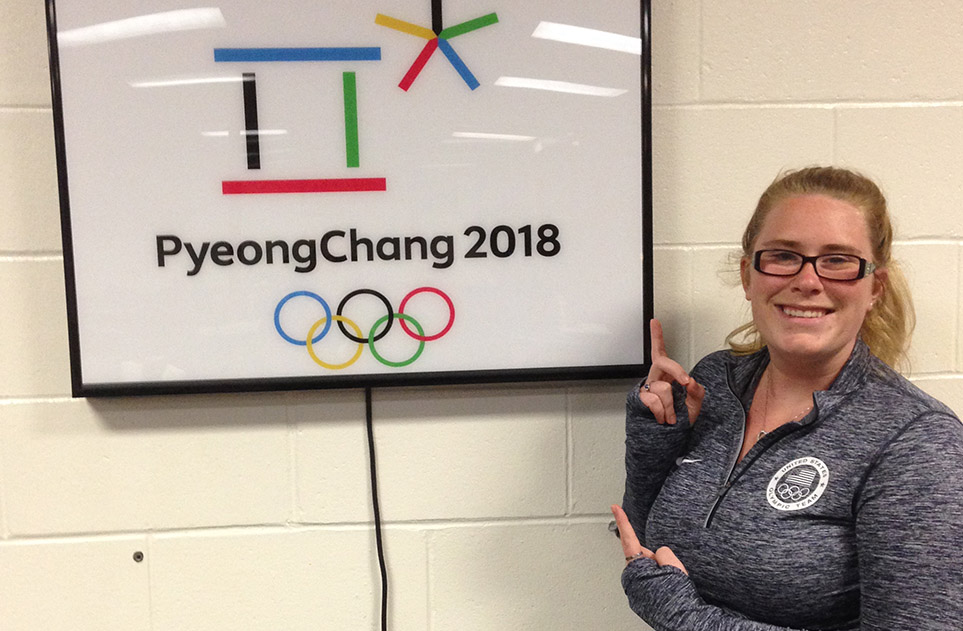
The Second Step:
Breakaway
She came to Pitt for her undergraduate degree, and during the summer between her junior and senior years, she had an internship at the Olympic Training Center in Lake Placid, New York, working with the national bobsled, skeleton, luge and biathlon teams. It was the summer before the 2018 Olympics in PyeongChang, South Korea so that made it even more special.
Once she graduated, she went on to get her master’s degree and had a graduate assistantship at East Stroudsburg University and volunteered with the athletic trainer of a junior hockey team, the Wilkes-Barre/Scranton Knights.
“All of my clinical preceptors were huge mentors for me, particularly Brian Bonnar, Pitt wrestling’s athletic trainer,” Rittle said. “That last semester of my clinical rotations, he had so much confidence in me and that in turn, helped me have the confidence in myself. And then same thing with Tim Goldinger with RMU hockey. He told me, “if this is what you want to do, this is what it is like; what we’re doing, this would be your life.”
“If I was going through a rehab with one of the players or if I was doing an evaluation, the preceptor is your safety net. But then once you’re a certified athletic trainer, you don’t really have that.
Another Pitt alum, Rick Joreitz, introduced her to Patrick Steidle, who at the time was one of the assistant athletic trainers for the Pittsburgh Penguins. “He was a huge mentor for me as far as passing along hockey jobs, any information that he heard, he would pass to me so that I could go and then apply.”
After graduate school, she worked at Virginia Tech for two years before moving to Fargo, North Dakota, as the first female athletic trainer with the Fargo Force.
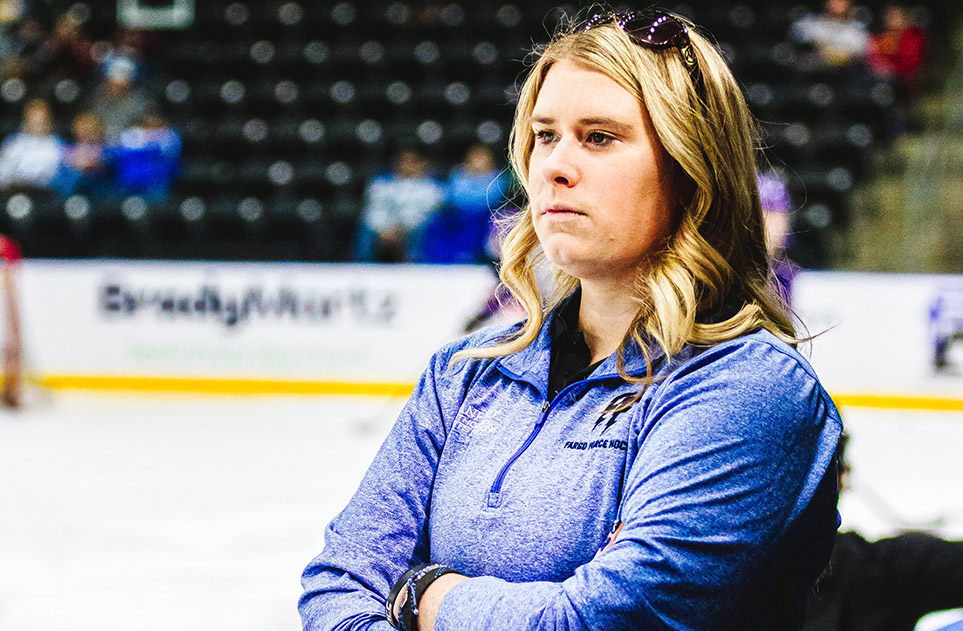
The Third Step:
Powerplay
When a position with the Wheeling Nailers became available, “I knew they were part of the Pittsburgh Penguins organization and being a Pennsylvania girl and a longtime Pittsburgh fan, it just seemed right to apply,” she said.
“Day one for me, as an employee, was two days before the team arrived. So you can imagine how crazy everything was, trying to get ready for the season. It was a wild ride. It was fun, it was great but it was a grind. The season started and we just we went from the 8th of October, and straight through until the middle of April.”
Through Wheeling’s team affiliation with Pittsburgh, Rittle was invited to the Penguins’ pre-season camp “to help with coverage, and with treatment because they were going to have two sheets of ice going at the same time.”
“That first preseason game was split so half the team was playing in Pittsburgh at one o’clock and the other half of the team was traveling to Columbus for a seven o’clock game on the same day,” she explained.
She stayed with the Pittsburgh group.
“The speed of the game was definitely faster. And I wasn’t the only athletic trainer. Chris Stewart, the head athletic trainer, was on the far end of the bench. And so if anything were to have happened on the ice, he would respond to it. And then I was there as a secondary, so if something happened with a player, if they were coming off the ice, I would go back into the athletic training room with the team physicians and take help take care of that.”
The Next Steps
As Rittle is pursuing her own dreams, she is also mentoring others. Right now, she has a master’s student from Chatham’s athletic training program working with her for an immersive clinical rotation.
“My dream is still to be an athletic trainer in the National Hockey League,” she says. “I don’t count having worked one preseason game as having achieved that goal yet. But it’s a step toward that ultimate goal of working in the NHL.”
About the School of Health and
Rehabilitation Sciences
The University of Pittsburgh School of Health and Rehabilitation Sciences (SHRS) is a nationally renowned leader in the field of health care education, research and clinical practice preparation. With 13 different disciplines related to health and rehabilitative care, SHRS shapes future generations of health care professionals—therapists, counselors, advocates, scientists, providers and practitioners—trained to serve the needs of all people regardless of background, levels of health or mobility. We are built on a legacy of academic excellence and innovation and fueled by passionate educators and researchers, allowing us to meet the health care and rehabilitation needs of today and drive meaningful change in the future. Learn how bold moves SHRS.
